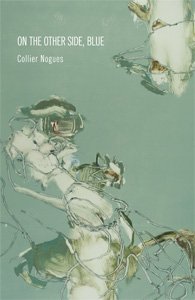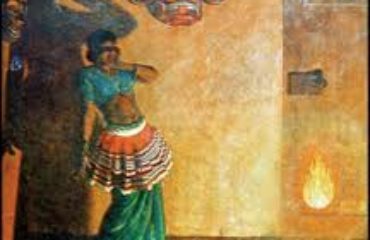
MISSISSIPPI
I know forgetting myself is a good thing, the best loss.
The trees look soft in the fog’s distance, egg-colored light
all over them. Even the sheep,
eggy.
The earth dries in ribs the rain has drawn on it.
Trees here grow up out of the water. Too little light
to tell what color but the ground that isn’t shining is made of leaves.
So these pools are mirrors:
were it on earth as it is in heaven,
blue land of we-will-all-meet-at-the-table,
I could be for other than myself successfully
without first having to lose someone I love.
THE FIRST YEAR IN THE WILDERNESS
i. Spring
My friend’s little daughter was pulled
under.
What began as a single
instance of labor became
circular:
the child’s mother on her hands
and knees, pushing
floor wax into tile grout
across the emptied house.
ii. Summer
Every window
hung with stained glass crosses
casting rainbows,
coloring
the throw rug and the wall.
Men. Silence,
great crashes of noise at long intervals.
The cat sacked out on the floor.
iii. Fall
Her prayer:
My preparations have outlasted
your stay,
so I have not only
the afterglow of you but also
little signs still
that you are bound for me.
iv. Winter
The only place open after midnight:
tall-stalked bar stools,
the valley laid into the wood
of the wall.
We stayed up
with the lottery sign’s crossed fingers,
while the animals
lay down in the field.
EX NIHILO
The beginning is spring.
The lanes are lined with poplars who lose their leaves to winter
but to whom nothing further wintry happens.
I design it so the marriage lasts as long as the lives,
and the children outlive their parents.
They are all startlingly easy to make happy. They recover
from unease like lightning.
When it falls apart my frustration is like a child’s,
unable to say, unable to make something
happen by saying.
To speak in someone else’s voice is a pleasure, but not a relief.
My tongue burns in its cavity.
My recreation of us is unforgivable
in the sense that I am the only one here to forgive it.
|
“Collier Nogues is a rare poet in the contemporary landscape. Her work is rife with the quick jump-cuts and fragments many young poets favor, but there’s no cynical irony for irony’s sake in her poems. This is poetry that earnestly engages with life’s big questions….A poet is, among other things, a protector of thoughts, a kind of police officer of the inner world. Nogues… makes it a little safer to think, a little less frightening and lonely.” — Craig Morgan Teicher from “Introducing Collier Nogues” in Pleiades, Volume 30 Number 1, 2010 |



